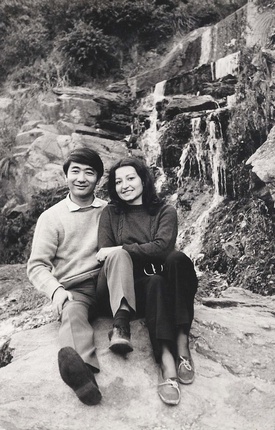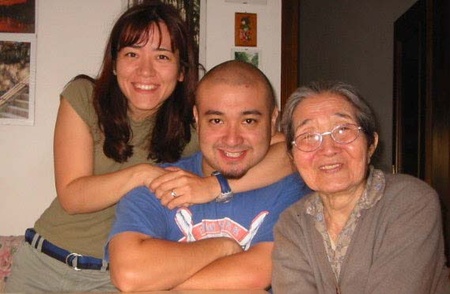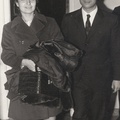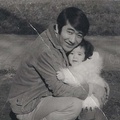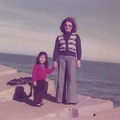Read part 3 >>
The Mothers of Plaza de Mayo
Beba, my mother, always got involved everywhere, without fear of anyone, she asked inconvenient questions, dangerous for the times. I was afraid for her. Since I needed to know what I was doing in those hours that I was in the company of my grandmother, I begged her to take me with her. On one of those times we went to march with the Mothers of Plaza de Mayo. It involved walking in silence around the May Pyramid, in front of the Casa Rosada itself. I remember that that day someone had brought sweet pastries. I, who had a sweet tooth, enjoyed those doughs voraciously. My mother told me: "Don't think they always bring us dough." But for me it was a way to find something positive to move forward. My life was fueled by little things. Meeting in houses with many people was prohibited, but that did not prevent secret meetings from being held. One day my mother and I entered one of those colonial houses, surrounded by rooms with an internal patio. People moved like ants with papers in their hands, others talked among themselves. My mother took me by the hand and told me that I had to meet someone: there, sitting in a chair, she introduced me to the person who would become the Nobel Peace Prize winner, Adolfo Pérez Esquivel. I was a girl when I was 8 or 9 years old, but Beba always treated me like someone older to talk to and told me things as they were, without sugarcoating them. He always introduced me to people who helped look for my father.
The mission
My mother had a mission in her life, to find Takashi, my old man. This was our life for 10 years. Without losing heart, my mother searched for my father along with Mary Higa who was looking for her brother Juan Carlos Higa. At the same time my mother opened a bookstore - toy store next to my grandparents' dry cleaners in the Pompeya neighborhood, in front of the square where my father played soccer and played the guitar. Thanks to the income from that business my mother managed to support us financially.
In her search, my mother found a witness who said that he had seen my father in a clandestine detention center in the province of Buenos Aires. Beba put us in the car along with Teresa, my maternal grandmother, and we drove in the Renault 12 along the route that led to the airport with the hope that that day we were going to meet my dad. We parked the car and my mom told me to wait while she walked toward a building surrounded by tall gray walls. It took a long time. We waited nervously looking in the direction Beba walked, but she came back empty handed. He told us that someone who left the area told him not to ask again. That day hope did not die, every time the doorbell rang we ran to the door hoping to see my father.
The end of the dictatorship
In 1983, Raúl Alfonsín became the new democratically elected president of Argentina. The military dictatorship had ended after seven and a half years of terror. During his electoral campaign, the radical leader promised the people that there would be no impunity for the crimes committed by the genocidaires. Some families thought that the disappeared were going to be released from clandestine detention centers. I remember that my mother called me to her room and with hope told me that we were going to meet my father again. I think she was actually convincing herself.
In 1985 the government of President Raúl Alfonsín began the trial against the first three Juntas of the dictatorship; It was the famous “Trial of the Juntas” for the human rights violations that took place between the period 1976-1983. The genocidaires Videla, Massera and other perpetrators were sentenced to life imprisonment.
In 1987, after the first “carapintada” revolt during Holy Week, President Alfonsín signed the Law of Due Obedience that established limits for the purposes of prosecuting those responsible for crimes against humanity, torture and homicides. After three other uprisings by the military between 1987 and 1990, President Carlos Saúl Menem proceeded to pardon the genocidal military. The impunity was a slap in the face for my mother, as were the other relatives of the disappeared. Although the Argentine justice system pardoned the criminals, other countries instead proceeded to judge them. In 2003, during the presidency of Néstor Kirchner, the National Congress annulled the pardons and the Due Obedience and Full Stop laws. My mother did not have the opportunity to see that day. I can only say that he suffered greatly from the lack of justice and saw the murderers walk free in the streets among us.
When my mother realized that my father was not going to return, she asked me if I wanted to go live in another country. This project involved solving a series of practical problems: to leave Argentina we needed passports and my father's authorization signature, since my brother was 11 years old and I was 14. Since my father was “disappeared”, under Argentine law he was considered how I live
Towards Italy
We managed to obtain permission from a judge to go on vacation alone, which became permanent until we were eighteen years of age. We could not return to Argentina until we came of age. We then went to Italy. Living in the homeland of my grandfather Juan or Giovanni (which was his birth name) was a new beginning for all of us. We always listened to his stories from when he was a boy, his stories about walled cities. We heard him speak in the Venetian dialect. I could finally see everything with my own eyes. We never forgot my father, but we didn't talk about him either. We missed him in silence. My mother never remarried; The day he received the death certificate he told me that my dad was the love of his life. For her, replacing him with someone else made no sense, because no one compared to him.
My mother bought an industrial photo laboratory in the Italian city of Treviso. He had several employees who developed rolls and printed photos for businesses, weddings and other events.
Beba, who had traveled to Italy a few months before to prepare for my brother's and mine's arrival, without telling me about the different schools available, enrolled me in a scientific high school and I had to take endless hours of mathematics and Latin for a year that were difficult for me. frankly unbearable. I remember that Carlotta, my benchmate, had the list of names in the class, every time they gave the exam grades out loud, Carlotta took out her notebook and methodically wrote down the results of each student to verify that she was the best. student. I wasn't interested in that environment and I couldn't wait for classes to end so I could go home and read or draw.
When I found out that there was an art school, I asked my mother to let me change schools. My mother answered me that she was going to find out what school it was. I remember that he spoke with a famous painter from the region who went to the laboratory to make reproductions of his paintings and also with Dalma Bresolin, his second cousin, who was also a renowned painter. He wanted to make sure that school was not a waste of time, but rather a place to learn.
After preparing all summer for the entrance exams, I performed and was finally able to enter the Artistic Lyceum of Treviso. That period was a rebirth for me, since I could finally express myself without fear of whoever was in front of me. I managed to forge friendships that I still have to this day.
When I lived in Argentina, I couldn't tell anyone that my dad was missing. I lied to strangers by telling them that my father was working if they asked anything about him. With so many spies or informants, nothing could be said. We lived on alert, always looking at our surroundings, or attentive in case we were being followed. On the other hand, when I walked through the streets of Treviso in Italy I felt really safe. I could be just another girl with no worries other than passing exams or doing drawings for figure classes. In Treviso during the 80s and 90s there was no Nikkei community, nor were there many foreigners living permanently. The only Japanese in sight were tourists. My teachers remembered my name the first week of school. I always stood out whether I wanted to or not. I didn't care, it made me laugh. My classmates were as curious to know about me, as I was about them. I was a kind of “weirdo”, an Argentinian with oriental features, but they accepted me right away. The same had not happened at the Liceo Científico, but at the art school where all the kids were peculiar in the eyes of the other students from other schools, I was just one more. It fit completely without problems.
I passed the “maturità” exams that lasted a week, that year in the subject lottery they had won architecture and mathematics and Italian. It wasn't very good news because in art school mathematics was one of the subjects we least appreciated. In Italian class you had to write some composition. Life is full of trials and I am glad that experience is in the past.
To be continued...>>
© 2017 Gaby Oshiro


